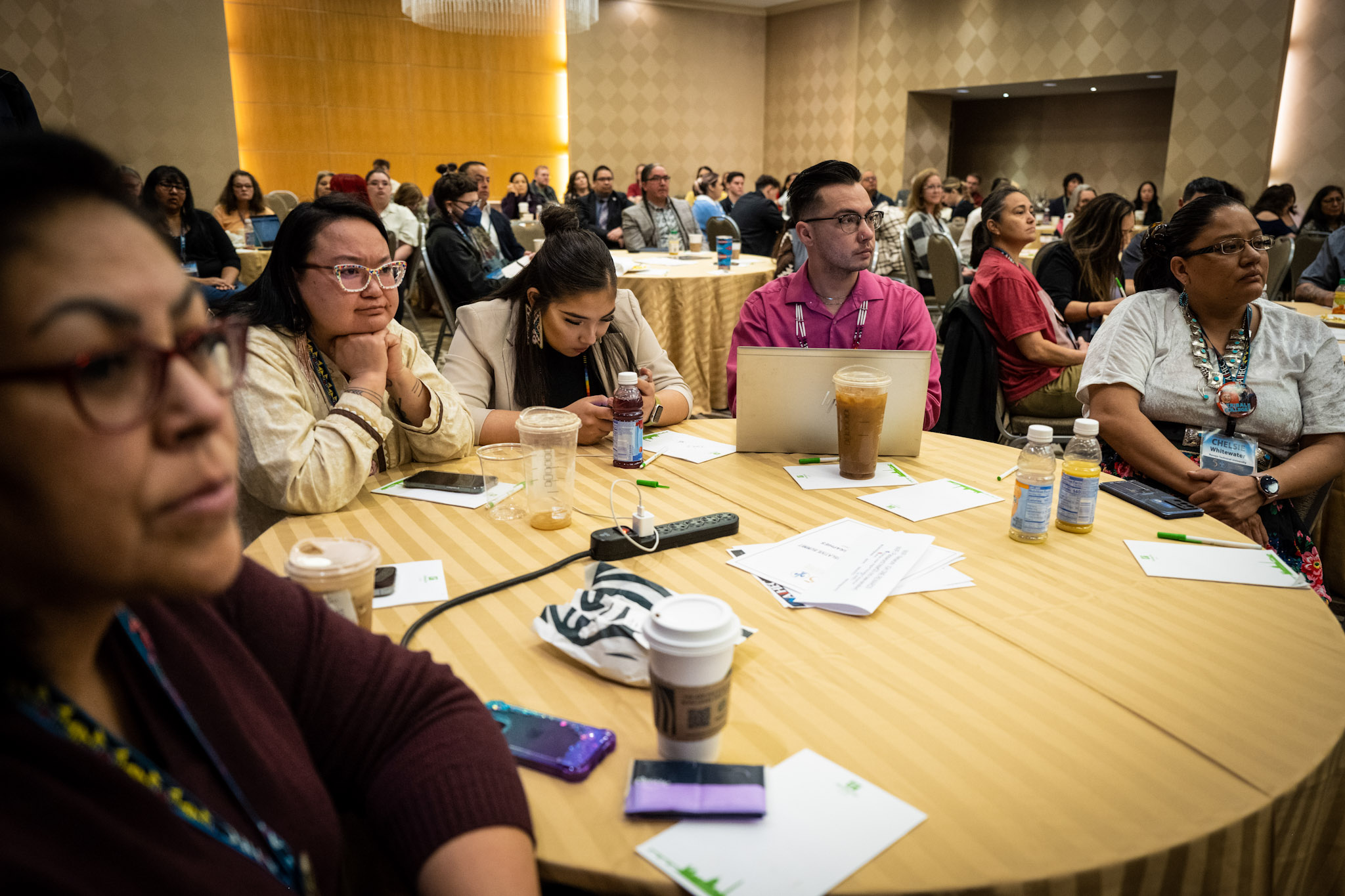Indianz.Com > News > ‘Collateral damage’: Indian education roiled by President Trump’s anti-DEI directives

‘Collateral damage’: Indian education roiled by President Donald Trump’s anti-DEI directives
Monday, February 3, 2025
Indianz.Com
With Indian education facing uncertainty at the federal level due to actions from the new presidential administration, tribal colleges and universities are seeing some significant — although symbolic — words of support from the U.S. Congress.
Last Thursday, the U.S. Senate passed S.Res.49 by unanimous consent, meaning there were no objections in the Republican-led chamber. The bipartisan measure designates the week beginning February 3 as National Tribal Colleges and Universities Week.
“I’m pleased the Senate passed my resolution designating this week as National Tribal Colleges and Universities Week,” Sen. Martin Heinrich (D-New Mexico), the sponsor of S.Res.49, said in a news release on Monday.
“This resolution recognizes the vital role of Tribal colleges and universities in creating opportunities for the next generation of Tribal leaders, upholding Tribal educational sovereignty, and preparing Native students for careers they can build their families around in their home communities,” said Heinrich, whose home state of New Mexico boasts three tribal colleges and universities, including the renowned Institute of American Indian Arts.
Nearly two dozen lawmakers, Republican and Democrat alike, signed onto the tribal college resolution as co-sponsors. One of supporters is Sen. Steve Daines (R-Montana), who has served on the Senate Committee on Indian Affairs since his arrival on Capitol Hill a decade ago. “Our tribal colleges and universities play a vital role in Montana’s communities and provide incredible opportunities for higher education on or near Montana’s reservations,” said Daines, whose state is home to seven such institutions of post-secondary learning. “I’m proud to introduce legislation so the hard work and great achievements of our Montana students, teachers and educational institutions can be recognized nationally,” Daines added. But national recognition of tribal colleges and universities comes barely two weeks after President Donald Trump took a swipe at the federal government’s trust and treaty responsibilities. On his first day in office on January 20, he rescinded a relatively non-controversial executive order that sought to boost Indian education across the board — from public schools that welcome the youngest American Indians and Alaska Natives to the higher institutions of learning that propel them to new careers and industries. The withdrawal of the order, titled White House Initiative on Advancing Educational Equity, Excellence, and Economic Opportunity for Native Americans and Strengthening Tribal Colleges and Universities, was followed by an even more contentious move. On January 27, the White House Office of Management and Budget (OMB) ordered a suspension of nearly $3 trillion in federal funds that has already been allocated for various grant, assistance and other programs across the U.S. government.With support for tribal colleges and universities threatened by the administration of President Donald Trump, the U.S. Senate has passed a bipartisan resolution designating this week as National Tribal Colleges and Universities Week. #TribalColleges #TribalUniversities #TCUs
— indianz.com (@indianz) February 3, 2025
Not to be outdone by National Tribal Colleges and Universities Week, Trump issued a proclamation in support of National School Choice Week on Friday — a day after the Senate passed the tribal college resolution. National School Choice Week officially ended on February 1. “As we return authority over education from Washington to the States, and from bureaucrats to parents, I recommit to working with State and Federal lawmakers to provide educational freedom for every American family,” Trump wrote in the proclamation.ED is taking action to eliminate DEI initiatives.
— U.S. Department of Education (@usedgov) January 23, 2025
This is the first step in reorienting the agency toward prioritizing meaningful learning and implementing President Trump’s vision to reform education. https://t.co/pwTHg3Xdsq pic.twitter.com/ptKlRt4v4f
Related Stories
Search
Filed Under
Tags
More Headlines
Press Release: National Museum of the American Indian hosts Native art market
AUDIO: Sea Lion Predation in the Pacific Northwest
Native America Calling: Tribal colleges see an uncertain federal funding road ahead
Native America Calling: Short films taking on big stories
Native America Calling: Advocates push back against new obstacles to Missing and Murdered Indigenous Relatives momentum
Native America Calling: For all its promise, AI is a potential threat to culture
NAFOA: 5 Things You Need to Know this Week (November 24, 2025)
Chuck Hoskin: Cherokee Nation invests in rural transportation
Native America Calling: Native candidates make strides in local elections
National Congress of American Indians returns incumbents and welcomes newcomers to leadership
National Congress of American Indians chooses leadership at big convention
‘Not voting is still a vote’: Native turnout drops amid changes in political winds
Native America Calling: Indigenous voices speak up, but have little clout at COP30
‘It’s bull****’: Indian Country confronts challenges at largest inter-tribal conference
Native America Calling: The constant burden on tribal hunters to justify their treaty rights
More Headlines
AUDIO: Sea Lion Predation in the Pacific Northwest
Native America Calling: Tribal colleges see an uncertain federal funding road ahead
Native America Calling: Short films taking on big stories
Native America Calling: Advocates push back against new obstacles to Missing and Murdered Indigenous Relatives momentum
Native America Calling: For all its promise, AI is a potential threat to culture
NAFOA: 5 Things You Need to Know this Week (November 24, 2025)
Chuck Hoskin: Cherokee Nation invests in rural transportation
Native America Calling: Native candidates make strides in local elections
National Congress of American Indians returns incumbents and welcomes newcomers to leadership
National Congress of American Indians chooses leadership at big convention
‘Not voting is still a vote’: Native turnout drops amid changes in political winds
Native America Calling: Indigenous voices speak up, but have little clout at COP30
‘It’s bull****’: Indian Country confronts challenges at largest inter-tribal conference
Native America Calling: The constant burden on tribal hunters to justify their treaty rights
More Headlines

